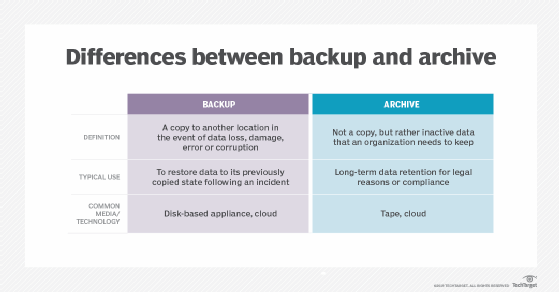
everythingpossible - Fotolia
Archival cloud storage market expands for channel partners
Channel partners can expect demand for archival cloud storage to grow as vendors mature their offerings. Learn about this cloud storage category's strengths and limitations.
Channel partners who don't already work with archival cloud storage should consider folding these long-term data retention services into their portfolios.
With the COVID-19 pandemic spurring an uptake in public cloud adoption, interest in cloud storage for archival purposes has grown, according to Paul Nashawaty, senior analyst at Enterprise Strategy Group, a market research firm and division of TechTarget.
"As heritage archival tools are being retired, new approaches are being reviewed to replace the … traditional ways of archiving data," he said.
Meanwhile, cloud-based alternatives to traditional archival methods have begun to address regulatory compliance and data sovereignty concerns, which have historically limited cloud adoption.
"Cloud storage vendors able to address the compliance concerns for healthcare, finance and research are capitalizing on the ability to leverage cloud storage for archival purposes," Nashawaty said. "This comes at a time where digital transformation initiatives are driving more demands and flexibility of data storage options."
The pandemic factors in
The coronavirus pandemic has increased cloud storage adoption, driven largely by organizations' need for remote access to data.
 Miles Ward
Miles Ward
For businesses with remote workforces, connecting back to the office network can pose complex issues and risks, said Miles Ward, CTO at SADA Systems, a Los Angeles-based cloud solutions provider. "Most networks weren't expecting to have that many people working from home."
Backing up large volumes of data from user desktops to the corporate network and out to different locations "creates logistical nightmares," Ward added.
As a result, many customers have chosen to migrate their data to cloud storage, rather than invest in network infrastructure and back up data on premises, he said.
Archival cloud storage uses
Competitive pricing has created a compelling reason to adopt archival cloud storage, specifically, as these services are less expensive than file or block storage, said Aaron Shaver, field CTO at Trace3, an MSP and IT consultant based in Irvine, Calif.
 Aaron Shaver
Aaron Shaver
Archival cloud storage is especially valuable for organizations in highly regulated industries that require long-term data retention for compliance. In addition, features such as immutability boost the appeal of archival cloud storage, Shaver said.
Cloud storage services offer auto-tiering capabilities that help organizations identify what data to archive. Auto-tiering can offset storage costs and increase performance. "We can tell which chunks of data are being accessed frequently and which aren't," Shaver said.
Birth records, for example, must be maintained indefinitely but are rarely accessed. With the growth of electronic records, adding new birth records can bloat data sets and negatively affect medical records system performance, he said. By archiving birth records, organizations can speed up database system processes.

Healthcare organizations that use machine learning and artificial intelligence for data modeling can also benefit from archival cloud storage. During the pandemic, healthcare organizations have used data modeling to follow the pathology of the COVID-19 virus and generate new vaccines, Shaver said. Since data modeling techniques require large data sets to create algorithms, organizations will typically use archival storage.
Security is another driver for archival cloud storage adoption. When organizations use multiple cloud providers to store copies of their data, they use those data copies to recover from ransomware attacks, Shaver said.
 Paul Nashawaty
Paul Nashawaty
Interoperability challenges linger
Appeal for archival cloud storage continues to grow, as vendors address security, regulatory compliance and costs. Many cloud providers have also introduced offerings that tout high levels of reliability, elastic expansion and simplified management, Nashawaty said. That range of options could broaden customer uptake.
"We may see the cloud storage market for [archiving] accelerate adoption," Nashawaty said.
Despite the evolution of archival cloud storage, however, compatibility issues remain. "[Most cloud APIs] are open source, or, at least, a public standard, but that doesn't mean old software plugs straight into a new system," Ward said. "Someone has to do compatibility engineering."
Ward noted that archiving is one of the most prominent technologies in terms of driving new interoperability standards among storage providers and cloud operators.







